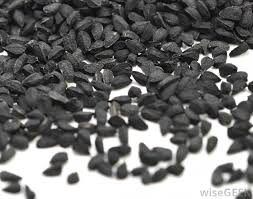Diabetes is a chronic condition characterized by high levels of sugars in the blood. It affects 28.5 million people, or 8.3 percent of the U.S. population, according to the National Diabetes Information Clearinghouse. The disease occurs due to reduced production of the pancreatic hormone insulin, or due to reduced sensitivity of muscle, liver and fat cells to the hormone. Common symptoms include blurred vision, frequent urination, fatigue, weight loss and thirst. Along with a healthy diet, exercise and medications, certain herbs such as black seeds might also help manage the condition.
Black seeds are obtained from the pods of the kalanji, or Nigella sativa, plant, native to India, Arabia and Europe. The seeds contain fixed oils, alkaloids and essential oils such as thymoquinone and thymohydroquinone, which are responsible for its immense medicinal value. The supplements are available as capsules, powders and oils, and have been used to treat a variety of conditions, including high blood pressure, liver diseases, cancer, rheumatism and asthma. No research has led to any formal recommendations for regular human consumption, says Drugs.com. Your doctor might help establish a regimen that is right for you.
Black seed extracts help inhibit the absorption of glucose in the intestines and improve glucose tolerance in laboratory animals, according to a study published in the January 2009 issue of the “Journal of Ethnopharmacology.” Another study in a 2009 issue of the “Bangladesh Journal of Pharmacology” reveals that crude Nigella sativa extracts reduce damage to beta cells in the pancreas, which are responsible for the production of insulin. This might lower the risk of type 1 diabetes, the study says. An article in the April 2011 issue of the “Journal of Endocrinology and Metabolism” reaffirms that thymoquinone found in black seeds can prevent the development of type 1 diabetes and increase the insulin sensitivity of liver cells, which helps prevent type 2 diabetes. Black seed extracts also possess significant antioxidant activity and might protect the pancreatic cells against the harmful effects of free-radicals, the study says.
(Source : livestrong.com)
